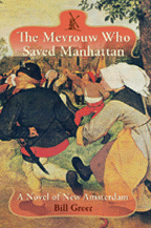Bill's Brownstone
Wander through New York's Past and Present with
the author of The Mevrouw Who Saved Manhattan
Dutch Days
"Nearly the just fourth of New Amsterdam consists of brandy shops, tobacco or beer houses, by the multitude whereof. . .the common people and the Company's servants are seriously debauched; and what is still worse, the youth. . .are drawn from the path of virtue."
- Peter Stuyvesant, 1648.
Stone Street was the heart of New Amsterdam's drunkenness and debauchery. Actually the street took that name only in 1657 when it was the first street paved with stone blocks. Before then the people called it "Brouwer" Street for the breweries that lined it. Philip Gerhardy's White Horse Tavern stood at the corner of Stone and Whitehall. One could enjoy a tankard in his garden overlooking the bog Blommaert's Vly, and don't worry if curfew came, Philip would keep serving.
Down the block brewed Isaac de Forest, who would also buy Jacob van Couwenhoven's brewery across Broad Street when the man piled up too much debt. Next door to Isaac was brewer Olaff van Cortlandt and across the street the tavern of Salomon La Chair.
Brewers leading youth astray were not the only notorious residents of Stone Street. De Forest bought his property from Harman van den Bogaert. Arriving as a young surgeon, Bogaert married, raised a family and became confidant to more than one Director, even serving as ambassador to the Mohawks. But a few years after selling to de Forest, he was caught in what the Dutch considered an unnatural position with a young man, becoming an early member of Manhattan's gay community. Unfortunately it was a capital crime. Bogaert ran off to the Mohawks but was recaptured. Attempting to escape, he fell through the ice of the frozen Hudson and drowned.
And in 1654, the first Jews arrived by way of Brazil. One of their number won the auction for a Stone Street house. The Director's Council refused to transfer the deed, one of many injustices the Hebrews endured. Amsterdam officials sharply reprimanded Director Stuyvesant for this injustice, reminding him of the substantial capital the Jewish community had invested in the West India Company. Their generosity in allowing Jews to own land did not extend to other privileges, however. Jews could not be employed in the public sector or allowed to open retail shops.
Bill's Book
The Mevrouw Who
Saved Manhattan
A Novel of New Amsterdam
like etchings by
Van Ostade and Steen."
-- Charles Wendell, Ph.D.,
President of the
New Netherland Institute

on a madcap ride through
New York history.
More about the book.
Amazon
for the Kindle
and the Nook
and see what you think
laughing out loud."
right on the money."
better ... toward a
highly satisfying resolution."